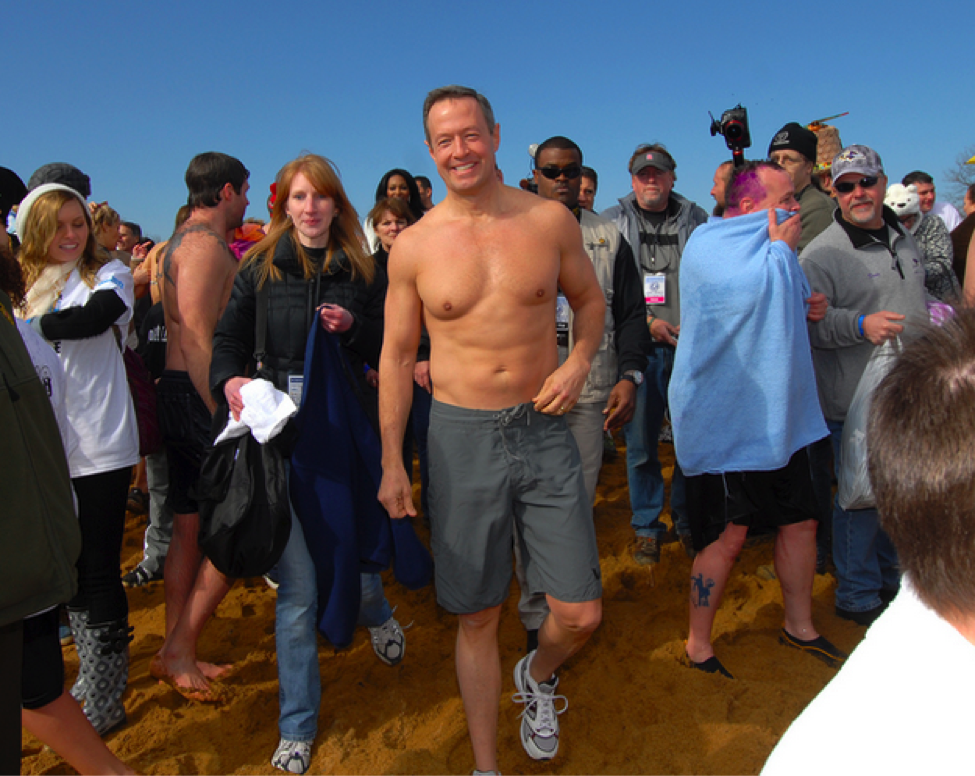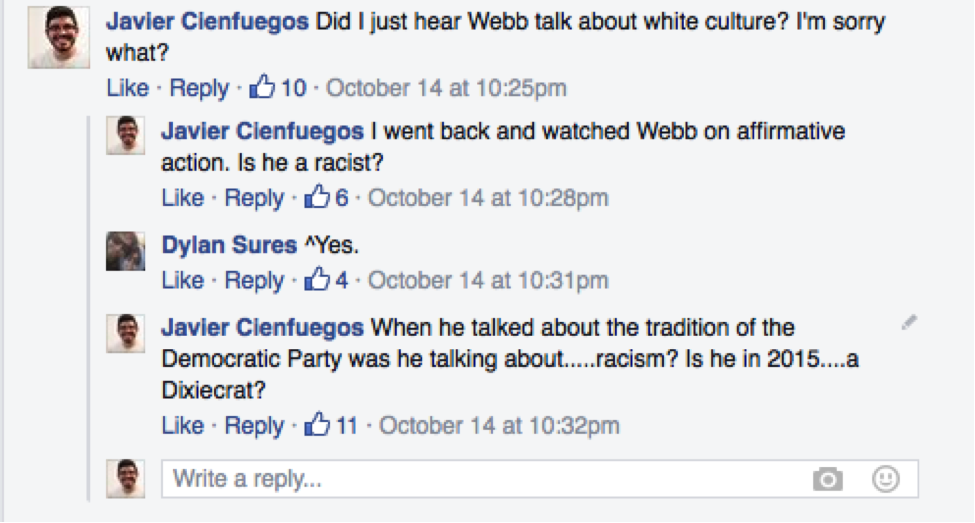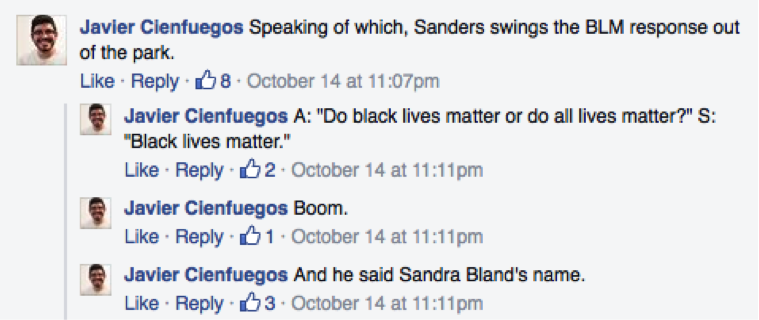by Javier Cienfuegos
This week’s Democratic Presidential Debate spurred a heated conversation online about who actually “won” the debate. According to CNN it was the frontrunner, former Secretary of State Hilary Clinton. Various online polls have the not-so-junior junior Senator from Vermont, Bernie Sanders as the victor. Pretty much everyone agrees that former Rhode Island Governor (and former Republican) Lincoln Chafee and former Virginia Senator Jim Webb bombed the debate spectacularly. As for former Maryland Governor (and current heartthrob) Martin O’Malley, Buzzfeed has him pegged as the hottest candidate around.
According to a Gawker article on the topic, “a little secret of political journalism is that the vast majority of it is just some jerk’s opinion, which has a scientific value roughly equal to your own idiot opinion.” Inspired by the hard-hitting journalists over at Gawker, I’ve decided that it’s time to share my own idiot opinions on this debate, so let me break it down for you all.
Admit it, if Lincoln Chafee hadn’t listed his CV as his intro, you would have had no idea who he was. In fact, after that intro, I still had no idea what he stands for or what he wants for the nation. The only thing I know is that irrelevant people don’t have scandals (and that this was a not-so-subtle way to bring up e-mailghazi). Also, Lincoln Chafee was literally a Republican during his time in the Senate.

Jim Webb also gives a CV in which he tells us that he was in the Reagan administration. He does know that this isn’t the GOP debate, right?
For real though, my favorite part is how proud he was of all of his children and their awesome careers. Except for Julia the massage therapist whose name he almost forgot entirely.
Martin O’Malley gives a real introduction to his campaign and not just a summary of his accomplishments. For a guy whose platform could probably consist entirely of his pecs, he manages to put climate change, gun control, and income inequality on the table pretty eloquently.
Fair warning here, I feel the Bern. And yes, I have gotten tested recently. Turns out I tested positive for endorsing a so-called “socialist.” (Karl Marx would beg to differ on whether or not Sanders is a socialist, but that’s a question for another time).
Anyway, Sanders’ intro is also issues-based, but he repeats some of what O’Malley literally just said, and that takes some of the steam out of it. Still, he manages to drop Citizens United and youth of color underemployment as critical issues in his campaign. That’s a pretty important angle to take for a guy who most people of color in this country haven’t even heard of.

Maybe it’s the hair, or maybe it’s because she’s practically American royalty, but Hilary Clinton reminds me of the rightful King of Narnia, Aslan.

In true Aslan-esque fashion, she addresses the public like she owns the place. Clinton is in her element here. Sometimes I can’t believe that she lost in ’08, but then I remember that Barack Obama is so likable that you forget he condones aggressive use of drones that kill innocent children every single day.

Not long after the introductions, each candidate was asked about their electability. Sanders defended calling himself a “democratic socialist,” and Hilary Clinton managed to argue (elegantly) that capitalism is about small business first and foremost. Martin O’Malley had a few sour moments discussing policing during his time as Baltimore Mayor, and Lincoln Chafee managed to bullshit his way through convincing Anderson Cooper that he’s not still a Republican. The best moment came when Jim Webb was asked about his views on affirmative action (and really minorities as a whole).
Yeah, Jim Webb said that he was part of “white culture” and that progressive race politics were pretty new to the democratic party. He argued he’s not out of touch with Democrats because of the party’s traditions. Well, it’s hard to argue with Webb here. The Democrats did support Jim Crow, and way back in the day, the did support slavery, but I didn’t think that anyone in 2015 could still be a Dixiecrat. I was wrong. So wrong.
The best Lincoln Chafee blunder came when he was asked about his Senate vote in favor of repealing Glass-Steagall in 1999. If Chafee is to be believed, it being his first vote in the Senate meant that he couldn’t understand what was going on in the bill.

Sure. His pro-corporate stance had nothing to do with the fact that he was literally a Republican Senator at the time.
When it came to foreign policy, Sanders managed to get the crowd on his side by saying he would not support having American troops on the ground in Syria, but in terms of negotiating the United States’ relationship with Russia, Sanders seemed a little lost.
Despite being a master of spin the whole night, not even Secretary Clinton was not without her missteps.
When asked about how Ms. Clinton’s first term would be different from an Obama third term, she responds by saying that she would be the first woman president. As awesome and inspirational as I think that is, I think Cooper was looking for a policy difference when he asked that question, not a demographic difference.
Unlike last month’s GOP debate, there were however, a few bright spots worth mentioning.
When asked the simple question: “Do black lives matter, or do all lives matter?” Senator Sanders responded quickly and forcefully: “Black lives matter.” He went on to say that in this country, racism means that black people like Sandra Bland can be pulled over in a routine traffic stop and end up dead in a jail cell three days later.
Sanders was also his consistent in his criticism of Wall Street, even going so far as to tell Clinton directly that “Congress does not regulate Wall Street. Wall Street regulates Congress.”
As one would expect from a former Secretary of State, Ms. Clinton managed to lay out the most coherent perspective on relations with Russia as well as on the turmoil throughout the Middle East (though I thought I detected an air of the interventionism she’s infamous for).
Clinton’s rhetoric on banks was much harsher than it has been in the past (though both Sanders and O’Malley pointed out that her policy proposals are nowhere near as harsh as theirs), and she admitted that she would like to see executives serve jail time for their role in the 2009 financial crisis.
Martin O’Malley served the important role in criticizing what many progressives see as the weakest spots in Clinton and Sanders’ respective campaigns: banking and guns. O’Malley stated that despite his 2008 support of her, Clinton’s unwillingness to be hard on banks after the financial crisis had made him feel differently about her in this cycle. With respect to Sanders, O’Malley joined a Clinton-led tag-team attacking the Vermont Senator’s support of rural gun owners. While Clinton chastising Sanders felt like empty talk, O’Malley was able to bolster his argument using his concrete accomplishments in Maryland gun legislation.
At the end of the debate, it was O’Malley’s willingness to criticize the frontrunners that left him the winner in my eyes. He spoke well, and his politics shone through as the middle ground between a somewhat cranky (though ultimately correct) Sanders and a hackneyed (though sophisticated) Clinton. Polls show that he’s a longshot to our next President, but if he keeps up performances like this, I’d be shocked if he doesn’t end up someone’s VP.















Please do more election coverage. You rock.